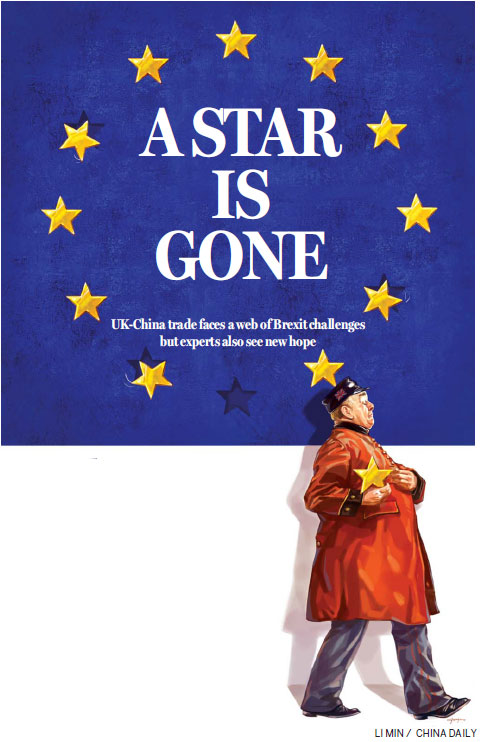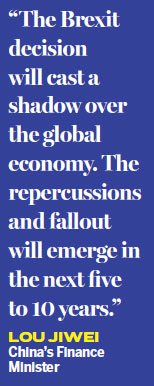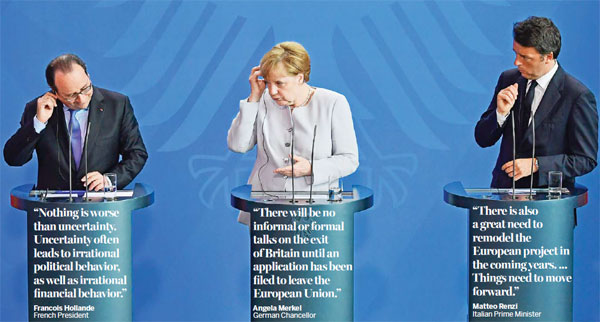A star is gone

UK-China trade faces a web of Brexit challenges but experts also see new hope
The British public shocked the world by voting to leave the European Union on June 23, leaving markets reeling, the pound plunging, and the UK's trading partners asking: "What does this mean for us?"
According to analysts and business figures contacted by China Daily, the Sino-UK trade relationship - described last year as entering into a "golden era" - is now a web of challenges and uncertainties, as well as potential opportunities.

In 2013, when British Prime Minister David Cameron visited China, bilateral trade between the two nations reached $70 billion (63.3 billion euros). In 2015, President Xi Jinping agreed to over 30 commercial deals worth $57 billion during a state visit to the United Kingdom and last year bilateral trade reached $78.5 billion.
Following the referendum, several economists and senior Chinese political figures voiced their concerns over the destabilizing effect a Brexit will have not just on the UK's economic relationship with China, but on world markets in the long term.
"The Brexit decision will cast a shadow over the global economy," Finance Minister Lou Jiwei said at the first annual meeting of the Asian Infrastructure Investment Bank in Beijing on June 25. "The repercussions and fallout will emerge in the next five to 10 years."
Premier Li Keqiang expressed concern over Brexit's effect on the global economy, as the Chinese yuan fell on June 27 to its weakest level against the dollar since 2010, and said a coordinated international effort would be needed to end market uncertainty.
"(The Brexit) has shown its impact on the international market and further increased uncertainties in the global economy. We hope to see a unified and stable EU, as well as a stable and prosperous Britain," Li said at the Summer Davos Forum in Tianjin on June 27. "I also want to say here that Europe is an important partner for cooperation with China, and China will continue to dedicate itself to maintaining the good development of Sino-Europe and Sino-British ties."
The EU market has played a major role in Chinese growth - Chinese imports into the EU have doubled over the last decade and reached 350 billion euros ($387 billion) last year, while EU exports to China hit 170 billion euros.
Huang Yiping, a member of the Chinese central bank's monetary policy committee, told the forum on June 26 that a Brexit was "very bad for the world, and very bad for China" and called the event a landmark in terms of the "reversal of globalization".

Klaus Schwab, founder and executive chairman of the World Economic Forum, says that the UK-China trade relationship is strong and he hopes the UK's vote to leave will not change this.
"What happened in Great Britain is one more challenge for the global economy, but I believe we will find new solutions to respond to it," Schwab told China Daily ahead of the forum. "I hope UK-China relations will continue to be intensive and friendly."
Stephen Perry, managing director of the London Export Corp and chairman of the long-established China-UK business network the 48 Group, believes it is "too early to tell" what impact the referendum result will have on the UK's trade relationship with China.
"It depends on how the UK and the EU settle their future relationship - that will be complex and take a long time and go through many different periods," he says.
A chief concern is whether China's interest in the UK will cool if it no longer views the country as the best entry point into the European single market.
"The reality is that the UK will be of no use to China within the EU now, with no influence left whatsoever," says Philippe Le Corre, a policy analyst in China-Europe relations and a fellow at the Brookings Institution think tank.
Andy Clayton, chief executive of LNP China, which helps companies do business with China, says that post-Brexit it will be in the interests of the UK to have negotiated some form of relationship with the EU when it eventually enters new bilateral arrangements with China.
"My sense is that the opportunity here for the UK is to negotiate and position ourselves in a way that we maintain enough access to the EU markets and have some form of preferential bilateral agreement with China, whereby we are still able to present ourselves as some form of stepping stone to access European markets."
If and when Article 50 of the Lisbon Treaty is triggered, the UK will enter into negotiations with the EU over its disengagement from the union, and for a two year period will still be governed by EU law and have continued access to the single market.
Article 50 is the process by which a member state wanting to leave the EU formally advises the European Commission in Brussels, which then starts formal negotiations on the departure terms.
Cameron, who announced his intention to step down before the Conservative Party conference in October, says he wants his successor to trigger Article 50.
As there is no precedent for a country exiting the EU, the best analysts can offer in terms of what the UK's post-Brexit future will look like is a handful of comparisons with existing trade models adopted by countries both on the continent and further afield.
According to Jeremy Cook, chief economist at international payments company World First, "doing a Norway" and joining the European Economic Area (EEA) is the model UK negotiators will "most likely pitch towards."
The model is the most similar to what the UK has now, with no tariffs and with open access for goods and services. However, Geoffrey Clifton-Brown, a legislator who is chair of the Conservative Friends of the Chinese, believes the UK will form a "different model possibly than any other model we've seen" given the size and complexity of the UK economy.
When it eventually leaves the EU, the UK will be able to cut free trade agreements with other economies though it will no longer benefit from the EU's existing free-trade pacts with 53 nations. Gaining the ability to form free trade agreements with China and other fast growing economies was one of Leave campaigner Boris Johnson's central arguments. The former London mayor, who bookmakers give the strongest chance of replacing Cameron as leader of the Conservative Party, reiterated the point in his column in the Telegraph on June 26: "we will be able to do free trade deals with the growth economies of the world in a way that is currently forbidden."
Though the prospect of cutting myriad new deals is something Cook calls an "onerous circumstance".
"Trade deals are not written on the back of a serviette and just passed across the table and someone goes, yeah that's OK. These are bilateral agreements for every product group under the sun, so the ability for us to do that simultaneously with countries that we've previously had long standing trade arrangements with the bureaucracy would be fantastical," Cook says.
Clayton believes negotiations over an FTA with China will likely start during the two-year disengagement period, though they would only reach completion after the UK cuts its new deal with the EU.
"I would say maybe a period of three to five years is probably realistic," Clayton says of a timeframe for a UK-China FTA.
Ma Yu, a senior researcher at the Chinese Academy of International Trade and Economic Cooperation in Beijing, agrees.
"The UK was Chinese companies' favorite European investment destination and has strong business and diplomatic ties with China," Ma says. "Under such circumstances, it shouldn't take long to complete China-UK free trade agreement talks if both sides want it to be done within a short period."
However, the Financial Times on June 27 speculated that "meeting future British negotiators may not be the most pressing concern for Asia's largest economy". It pointed to a Goldman Sachs report showing that, as a stand-alone nation outside the EU, the UK accounts for just 2 percent of total China trade.
He Wenwei, director of the research center for European and American studies at the China Association of International Trade in Beijing, says that China-EU negotiations will be more difficult now the UK is set to vacate its place at the table in Brussels. The UK has been one of China's biggest allies in Europe on issues such as China's bid for market economy status, something the EU has thus far blocked.
"Because the UK used to have a strong voice in Brussels, its withdrawal from the EU will raise China's time and resource costs in negotiating the China-EU free trade agreement and a comprehensive EU-China investment agreement with the EU without the UK."
Zhong Nan and Zhao Huanxin contributed to this story.
angus@mail.chinadailyuk.com
| The leaders of France, Germany and Italy address a news conference in Berlin on June 27 ahead of talks on Britain's decision to leave the EU. John Macdougall / AFP |
(China Daily European Weekly 07/02/2016 page1)
Today's Top News
- Takaichi must stop rubbing salt in wounds, retract Taiwan remarks
- Millions vie for civil service jobs
- Chinese landmark trade corridor handles over 5m TEUs
- China holds first national civil service exam since raising eligibility age cap
- Xi's article on CPC self-reform to be published
- Xi stresses improving long-term mechanisms for cyberspace governance































